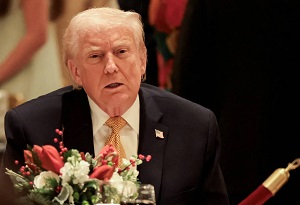Indian pundits, stakeholders see strong chances of greater Jordan-India cooperation

AFP
AMMAN — Indian economists, opinion leaders and business representatives said Jordan can be a hub for Indian businesses seeking to penetrate several world markets as they can benefit from free-trade agreements the Kingdom has entered with heavy-weight international partners.
The Indian economists and opinion leaders interviewed online by The Jordan Times on Saturday said they highly valued His Majesty King Abdullah’s visit to India last week, saying they were impressed with the 12 agreements the two countries signed and that the scope for greater cooperation between India and Jordan is brighter than ever before.
They also lauded Jordan’s recent decision to provide visas to Indian nationals upon arrival.
Jordan’s position, stability and skilled workforce coupled with the free trade agreements with the US, Turkey and access to Iraq, Africa and Gulf countries as well as deals with Europe and several other states were highlighted as key benefits for Indian businesses seeking a foothold in the region.
“There are immense cooperation opportunities between India and Jordon, especially in the field of trade, IT, healthcare and defense. Tourism being an important sector of Jordanian economy is also likely to get a significant boost due to the easing of Visa restrictions,” Jayesh Kumar, an economist at Kotak Securities, one of the oldest and largest Equity Broking House in India, told The Jordan Times on Saturday.
Indian businesses would benefit by investing in Jordan due to its free trade with the US and easy access to Gulf and Europe, Kumar added Saturday.
During His Majesty’s visit to India, the two sides signed 12 agreements in areas of defence, health and medicine, manpower cooperation. A MoU was also signed for setting up of a next generation centre of excellence (CoE) in Jordan for training of at least 3,000 Jordanian IT professionals over a period of five years, and setting up of a resource centre in India for training of master trainers in the IT field from Jordan. Other agreements signed include long-term supply of rock phosphate and fertilisers to India.
“Long-term MoU on rock phosphate ensures long-term and sustained supply of rock phosphates to India, a key raw material in Indian fertiliser consumption. It also ensures alignment of long-term business interests between two countries,” he said.
The economist added that Indian investments in Jordan’s IT and healthcare sector are likely to increase due to the availability of skilled workforce and better diplomatic relations.
“Diplomatic relations between two countries are likely to grow warmer, removal of the visa requirement for diplomatic and official passport holders in a welcome move,” he added.
King Abdullah’s visit to India was “ extremely productive and useful” for deepening bilateral relations, said Professor Sachin Chaturvedi, director general of New Delhi-based Research and Information System for Developing Countries (RIS), in remarks to The Jordan Times on Saturday.
“We are quite impressed by the list of the 12 MoUs that have been signed, particularly in the area of skill upgradation in Jordan and cooperation in the realm of health and medicine with potential for joint research, medical education, and strengthening of universal healthcare programmes across the two countries,” Chaturvedi said.
India has also agreed to establish a Phosphoric Acid / NPK Fertilizers production unit in Jordon with 100 per cent buy back arrangement and also to strengthen customs related facilities in Jordon for its automation and administration, he said.
“The agreement between Agra and Petra to work jointly for promoting social relations by cooperating in the areas of tourism, culture and sports gives greater hope for people to people contact. The establishment of a Hindi Chair at the University of Jordon and cultural exchange programme envisaged in the relevant MoU are the steps that underline the importance of people to people cooperation,” Chaturvedi said.
“At this stage, investments are also extremely marginal. The Jordanian Businessmen Association (JBA) has come forward for greater cooperation with more than 10,000 Indians in Jordan. Thus, the scope for greater cooperation and mutual understanding between India and Jordan is brighter than ever before,” the academic said.
Sidhant Siba, a correspondent at DD News, said cooperation in the tourism field and people-to-people cooperation is a great area for increased activity.
“Lawrence of Arabia movie made [Wadi Rum] famous. May be a Bollywood movie thee can help gain popularity,” he said.
Jordan is an area of stability in West Asia and a lot of Indian businesses can make it their base, Siba said, adding that Jordan’s FTAs with international partners can help a lot.
The journalist added that Jordan should take care of the communication aspect of the partnership.
“Jordan needs to tell Indian businesses why it can become a good base [for them]. You already provide visa on arrival, but lot of people do not know,” he said, adding that counter-terrorism was another area of cooperation.
“It is the people-to-people contact that has to be increased. Jordan still does not occupy lot of mind space for many Indians and that needs to be [addressed]. Lot of Indians in diaspora are in West Asia but not in Jordan… Jordan can also provide Indians access to Al Aqsa,” he said.
On easing visa restrictions for Indian nationals, Jose Sleeba, executive director Royal Omania Travel, said it was a positive step.
“The new regulation is very good for Indian tourists and this will increase more tourists to Jordan from India,” said the executive, who regularly brings Indian tourists to visit Jordan and Palestine.
Latest News
-
 Trump Says Had 'Productive' Call with Putin Ahead of Zelensky Meeting
Trump Says Had 'Productive' Call with Putin Ahead of Zelensky Meeting
-
 Netanyahu to Meet Trump in US on Monday for Talks on Iran, Gaza, Hezbollah, Syria
Netanyahu to Meet Trump in US on Monday for Talks on Iran, Gaza, Hezbollah, Syria
-
 JMD forecasts heavy rain, brisk winds, low visibility
JMD forecasts heavy rain, brisk winds, low visibility
-
 Prince Hassan congratulates Christians on Christmas
Prince Hassan congratulates Christians on Christmas
-
 Zelensky says Kyiv attack shows Russia does 'not want to end the war'
Zelensky says Kyiv attack shows Russia does 'not want to end the war'